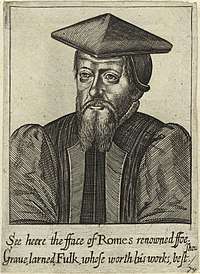William Fulke
Life
He was born in London and educated at St John's College, Cambridge graduating in 1557/58.[1]
After studying law for six years, he became a fellow at St John's College, Cambridge in 1564.[2] He took a leading part in the vestiarian controversy, and persuaded the college to discard the surplice. In consequence, he was expelled from St John's for a time, but in 1567 he became Hebrew lecturer and preacher there.[1]
After standing unsuccessfully for the headship of the college in 1569, he became chaplain to Robert Dudley, 1st Earl of Leicester, and received from him the livings of Warley, in Essex, and Dennington in Suffolk. In 1578 he was elected master of Pembroke Hall, Cambridge.[1]
As a Puritan controversialist he was remarkably active; in 1580 the bishop of Ely appointed him to defend puritanism against the Roman Catholics, Thomas Watson, ex-Bishop of Lincoln (1513–1584), and John Feckenham, formerly abbot of Westminster, and in 1581 he was one of the disputants with the Jesuit, Edmund Campion, while in 1582 he was among the clergy selected by the privy council to argue against any Roman Catholic.[1]
Works
His numerous polemical writings include A Defense of the Sincere and True Translations of the Holy Scriptures into the English tongue, against the Manifold Cavils, Frivolous Quarrels, and Impudent Slanders of Gregory Martin, one of the Readers of Popish Divinity, in the Traitorous Seminary of Rheims (London, 1583), and confutations of Thomas Stapleton (1535–1598), William Allen and other Roman Catholic controversialists.[1][3]
References
-

- "Fulke, William (FLK555W)". A Cambridge Alumni Database. University of Cambridge.
- The Battle Over The Hebrew Vowel Points, Examined Particularly As Waged in England, by Thomas D. Ross, pp. 13-14 Online
External links
| Academic offices | ||
|---|---|---|
| Preceded by John Young |
Master of Pembroke College, Cambridge 1578–1589 |
Succeeded by Lancelot Andrewes |
